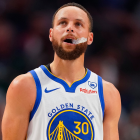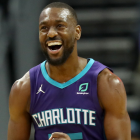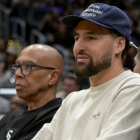Victor Oladipo's free agency is creeping up on the Indiana Pacers. Despite giving them only one fully healthy season during the 2017-18 campaign, he is set to hit unrestricted free agency in the summer of 2021. That is potentially problematic for the Pacers on a number of levels, the most immediate of which is Oladipo's health. After an All-NBA 2017-18 season, Oladipo has played in only 49 total games thanks to a variety of leg injuries. In limited action this season, he has scored only 13.8 points per game on around 39 percent shooting from the field.
This makes negotiating a potential extension extremely difficult. Oladipo at his best was a max player. Oladipo in his current state decidedly isn't. The Pacers reportedly tried to thread that needle before this season, as SNY's Ian Begley reports that the two sides discussed a four-year, $80 million extension, but those talks didn't go far. Both sides could potentially improve their bargaining position when play resumes, either this season or next season, but Indiana's track record suggests that it would strongly prefer to agree to a compromise ahead of time.
The Pacers locked up both Myles Turner and Domantas Sabonis to extensions after their third seasons. Rather than engaging in a bidding war with the Milwaukee Bucks for Malcolm Brodgon, they agreed to a sign-and-trade before free agency even began that theoretically limited his price. The Pacers have historically been willing to make concessions in the name of finalizing deals, and it's not hard to see why.
Indiana is arguably the most cost-conscious franchise in the NBA. The Pacers have never paid the luxury tax in its current form, last doing so at all during the 2005-06 season when it was far less punitive. They have ranked 23rd or lower in team salary in each of the past five seasons. The Pacers play in one of the NBA's smallest markets and have been owned by the same person for nearly 40 years. While Herb Simon can hardly cry poverty with a projected $2.4 billion net worth, that number is fairly modest in an NBA in which Steve Ballmer can buy competing arenas with cash.
The Pacers cannot afford to throw money around with the big boys. They already owe Sabonis, Turner and Brogdon nearly $200 million beyond this season combined. If someone offers Oladipo the max on the open market, whether or not he deserves it, the Pacers would struggle to match such an offer.
Begley suggests that if the Pacers were to consider a preemptive trade to unburden themselves of such a financial commitment, a number of teams would be interested. That list would include both New York teams, the Knicks and the Nets, though the fit in both cases is questionable. Brooklyn already has two high-usage ball-handlers, theoretically limiting Oladipo's offensive impact (though his elite defense would be more than welcome). The rebuilding Knicks just went through the injured star experience with Kristaps Porzingis, and before that Amar'e Stoudemire. They could be understandably gunshy.
But opportunities to trade for stars in their prime, at least from an age perspective, are rare. If the Pacers were to make Oladipo available, there would be no shortage of suitors willing to take the risk. If Indiana doesn't want to pay its former All-Star, then someone else will.


















